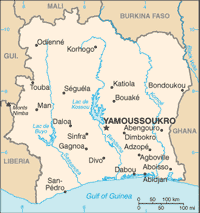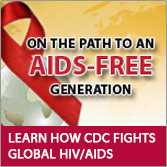Côte d’Ivoire
HIV/AIDS in Côte d’Ivoire
- 2.7% Estimated HIV Prevalence
(Age 15–49) (2013) - 28,000 Estimated AIDS Deaths (2013)
- 400,000 Estimated Orphans due to AIDS (2013)
- 104,750 Reported Number of Adults Receiving Antiretroviral Therapy (ART)(2012)
- 55% Estimated ART Coverage per WHO 2010 Guidelines (2012)
SOURCE:
UNAIDS Gap Report, 2014; UNAIDS Global Report, 2013

Strategic Focus
CDC began working in Côte d’Ivoire in 1987, establishing a field station in Abidjan and launching the Retrovirus Côte d’Ivoire (CDC Retro-CI) project to research some of the most important questions about HIV worldwide. This early effort has expanded to include a vastly strengthened public health system through CDC’s support of the U.S. President’s Emergency Plan for AIDS Relief (PEPFAR). Key HIV focus areas include HIV testing and Counseling (HTC), prevention of mother-to-child transmission (PMTCT), blood and injection safety, strategic information, laboratory system strengthening, key and priority populations, and HIV care and treatment. In addition, there is a strong focus on addressing opportunistic infections such as tuberculosis (TB) as well as enhancing pediatric treatment coverage.
Maximizing Unique Government-to-Government Relationships
CDC works closely with the Ivorian Ministry of Health and Fight Against AIDS (MSLS) to integrate comprehensive HIV services in country. CDC also supports the National AIDS Control Program (PNLS) to engage all components of the health sector and to advance national policy and research priorities. CDC’s strong relationship with MSLS has resulted in the development of additional ties with the Ministries of Education (MEN), and Solidarity, Women, Children and Families (MSFFE), enabling greater coordination and leveraging of funds as well as programming across government sectors.
Key Activities and Accomplishments
Strengthening Health Systems
CDC supports strengthening technical leadership, advancing laboratory quality standards, and improving HIV and other transfusion-transmissible infection screening procedures in Cote d’Ivoire
As of 2014, CDC helped develop over 1,062 care and treatment sites, 885 PMTCT sites (including training personnel and equipping labs), and 119 blood centers (enabling 142,168 safe units of blood to be collected in 2014). In addition to implementing early infant diagnosis and viral load testing, CDC supported the establishment of an external quality assurance panel program, which is implemented in 15 serology sites and 30 hematology and biochemistry sites.
Through MSFFE, CDC supports PNOEV, the national coordination center for orphans and vulnerable children (OVC) issues. PNOEV drafts and validates national policy documents on OVC service delivery, analyzes trends in OVC needs and priorities, and strengthens human and institutional capacity to implement decentralized coordination, referral, and data collection systems. Through CDC efforts, the MEN has worked with MSLS and MSFFE to incorporate age-appropriate HIV/AIDS information into school curricula, integrate sexually transmitted infection and HIV services into school clinics, and support social workers in schools for OVC follow-up.
Contact Us:
- Centers for Disease Control and Prevention
1600 Clifton Rd
Atlanta, GA 30333 - 800-CDC-INFO
(800-232-4636)
TTY: (888) 232-6348
24 Hours/Every Day - cdcinfo@cdc.gov
 ShareCompartir
ShareCompartir



